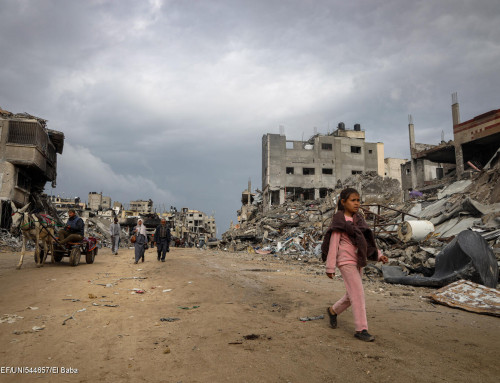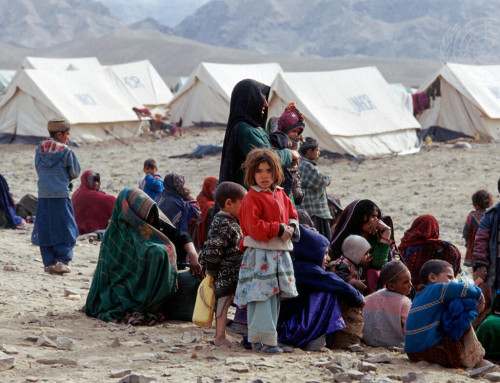Statement by Ms. Virginia Gamba, SRSG-CAAC at the Third Committee of the General Assembly Discussion of the Promotion and Protection of the Rights of Children Item 71 (a)
7 October 2022
Mr. Chair,
Excellencies,
Distinguished Delegates,
I am honoured to address the Third Committee alongside Ms. Najat Maalla M’jid and Mr. Sanjay Wijesekera of UNICEF who are among key partners in my work to protect children. It is my pleasure to present to you my report to the General Assembly (A/77/143) and brief you on the progress of my mandate, and the challenges and opportunities standing before us as we advocate for the protection of children affected by armed conflict.
In 2021, the United Nations verified nearly 24,000 grave violations committed against children. Violations with highest verified numbers were killing and maiming and recruitment and use, followed by the denial of humanitarian access and abduction. Abduction of girls was strikingly on the increase at 40 percent compared to the previous year. Data collected through the Monitoring and Reporting Mechanism continues to show that boys and girls are impacted by grave violations differently. Our data gathered for the first half of this year shows that these trends continue.
In this pivotal year of its 25th anniversary, my Office produced a study on the evolution of the children and armed conflict mandate published in January that outlined successes made, as well as concrete recommendations for addressing existing gaps going forward. Among the areas identified for looking ahead was strengthening data analysis, therefore my office is developing studies on the impact of grave violations on children with disabilities in armed conflict, the links between climate insecurity and the six grave violations, the linkages between child trafficking and the six grave violations, as well as a guidance note on the denial of humanitarian access and armed conflict.
This work is aligned with my Office’s continued promotion of lessons learned and best practices. This year, we also published the “Guidance Note on Abduction” drafted in close cooperation with UNICEF, the Department of Peace Operations and the Department of Political and Peacebuilding Affairs.
Bearing in mind the aforementioned trends in violations and with the objective to continue strengthening data collection and analysis on the ground, my Office also conducted this year a study on the gender dimensions of grave violations against children to examine, in particular, how gender shapes the type of violations that different children experience, and therefore their distinct needs for protection and prevention responses.
Partnerships across the UN system, with regional and subregional organizations, academia, and civil society remain the backbone of my mandate.
In April this year, in collaboration with Save the Children, War Child, the UK Foreign Commonwealth and Development Office, and the Norwegian Ministry of Foreign Affairs, I convened a range of partners across the UN, Member States and civil society in Wilton Park to discuss ways forward for the children and armed conflict agenda, and new ideas emerged for follow up using the occasion of the anniversary. Themes of prevention and reintegration came strongly on top of the partners’ agendas.
It was recognized that in the first 25 years of the mandate, multitude of robust tools and initiatives have been developed at different levels for protecting children from grave violations in situations monitored through this agenda. Twenty-six years into the mandate, a proposal was made to collect all existing tools and initiatives related to children and armed conflict into a comprehensive international framework at the General Assembly level for unifying elements of this agenda towards better protecting children and preventing violations. Now as ever, the best solution to protecting children remains the prevention of violations in the first place and sustaining peace, including through delivering on improved reintegration of children.
As for reintegration, we continued our efforts this year, building on the Global Coalition for Reintegration for Child Soldiers’ research and recommendations. Among others, my office is collaborating with the World Bank to organize a financing innovation forum to seek financing modalities for reintegration programmes. My Office is also collecting recommendations through dialogues with national stakeholders working on child reintegration, which will be discussed during an international Symposium in Nairobi gathering all stakeholders involved in reintegration programming, including affected children.
Mr. Chair,
With currently monitoring 25 situations on our agenda, our work is cut out for us. In 2021, despite the challenges, we were still successful at conducting dialogue with parties to conflict resulting in the release of over 12, 200 children and adoption of new legislation and accountability measures, among other outcomes. At least 40 new commitments and agreed measures were put in place by warring parties to better protect children, including for example the signature of action plans with the UN in Mali by the Platform in August 2021 and in Yemen by the Houthis in May 2022 to end and prevent grave violations against children.
After my trip to South Sudan in June where I participated in a national conference on children and armed conflict, I secured a concrete commitment for the Government to establish a child protection focal point within the Ministry of Justice to assist prosecutors with any training needed to better implement the existing laws criminalizing the six grave violations. During my visit to Cairo, I explored with the Leage of Arab States representatives, Member States and partners ways to strengthen regional prevention initiatives, integrate child protection in mediation processes, and protect education from attack. I also advocated for establishing dedicated child protection capacities within the LAS.
This year I also visited Brussels, Doha, Andorra, the United Kingdom, and France after resuming official in-person travel that resulted in obtaining concrete agreements for cooperation such as in the signing of an agreement with the Qatar Fund for Development in Doha to support my Office’s resources. Additionally in Paris on the International Day to Protect Education from Attack, I signed a memorandum of understanding with UNESCO to strengthen our cooperation.
To continue to raise awareness, I participated in 31 conferences and my Office published over 40 press releases and statements, some jointly with high-level partners, to publicly call for the respect of their rights and needs before, during and after conflict.
My daily work, however, entails meetings with Member States whose tireless support for our advocacy remains imperative to keeping the issue of children and armed conflict visible and high on the political agenda. Such support is visible through the creation of groups of friends we work with as critical platforms for information-sharing and advocacy, and for instance this year, I participated in the unveiling of the Brussels-based Group of Friends of Children and Armed Conflict to the European Union at the initiative of Belgium and Italy. In Yemen, a Group of Friends of Children and Armed Conflict was also established this year.
To close, my Office and I stand ready to engage with the membership and support the work of Member States and regional and subregional organizations. Children affected by conflict deserve no less than our utmost dedicated commitment and collective actions.
I thank you.




